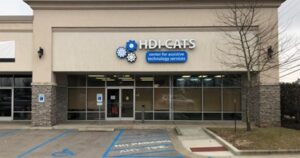Over the past several years, the mental health of students has declined. According to the CDC, the pandemic saw mental health concerns reach a crisis level. Suicide is the second-leading cause of death in youth aged 10–24. Mental health emergency visits increased 31% in youth aged 12–15 from 2019–2020. Anxiety and depression rates in youth continue to rise.
Universally designed, accessible safe spaces create a sense of welcome and belonging for all students, including those with mental health conditions, physical disabilities, intellectual and developmental disabilities, and those in underserved communities.
The Human Development Institute’s new project will fund universally designed spaces for students at Berea Community School, a high school, to allow students to build meaningful connections. Berea is a Title I school that faces persistent poverty, low educational attainment, and low attendance and graduation rates compared to the state of Kentucky.
At Berea Community School, 11% of students have intellectual and developmental disabilities including, but not limited to, autism and attention deficit hyperactivity disorder (ADHD) and are members of underserved communities.
Berea Community School has a respite time each school day. This project will create universally designed spaces at school to encourage connections during the respite time. Additionally, this project will support a peer student group that will receive training on strength-based activities and how to include them in the daily respite time.
The use of Universal Design for Learning (UDL) Principles will be prioritized to provide students with more options for inclusive learning. School staff and faculty will be given professional development sessions on universal design and universal design in learning.
“Providing universally designed spaces will ultimately increase cultural responsiveness and create a healthier, more inclusive school climate,” Dahl, the Principal Investigator, says. “[That] is especially important for individuals in marginalized populations, including those with disabilities and LGBTQ+ students.”
Universal Design principles will be used to assess the space at Berea Community School. A wide range of body sizes and abilities, comfort, wellness, social integration will be prioritized for treating all groups with inclusiveness and respect and cultural appropriateness.
HDI’s mission is to advance efforts that build inclusive communities, address inequities, and improve the lives of all people who experience disability across the lifespan. We achieve our mission through leadership and community partnerships across Kentucky and the Nation. This project strives to build inclusive communities by ensuring all students feel welcome and safe.



